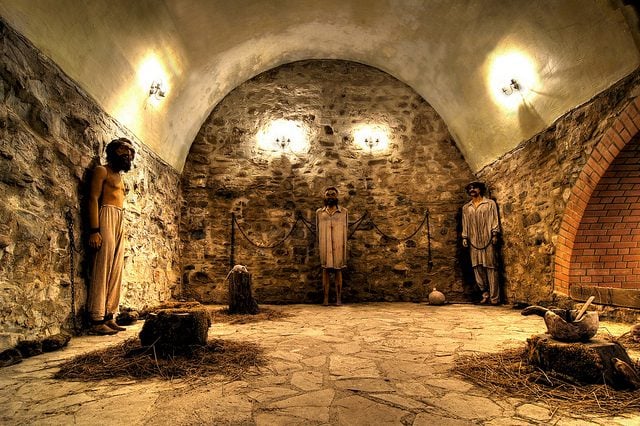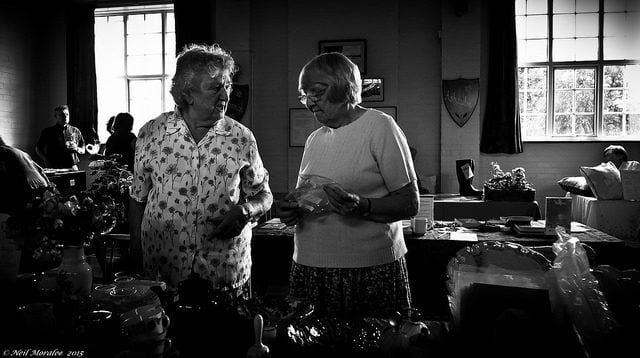Christmas 2C — Matthew 2:13-15, 19-23
A few months ago, I let my spouse read a draft of a sermon I wrote and, when she was finished, she just shook her head.
“Don’t you ever preach on anything happy?” she asked me.
I began to protest, but she stopped me. “Just once,” she said, “would it kill you to preach on, you know, sunshine and butterflies?”
Since then, “sunshine and butterflies” has become both a running joke and our code for when I maybe I could lighten up a little theologically.
However, I still took her challenge seriously, and I decided that maybe this new year — 2016 — might be my year for sunshine and butterflies as a preacher.
And then, for my first sermon of the New Year, we get this: Terror, the death of babies, and the holy family fleeing as homeless refugees in the middle of the night.
So much for New Year’s resolutions. So much for sunshine and butterflies.
To be honest, I hate this story.
I hate Herod for his power hungry madness.
I even hate the Magi a little for showing up and tipping Herod off about the star and accidentally inciting him to massacre so many young children.
Part of me even hates Joseph for not warning his friends and families, for not taking even a few seconds to whisper to a neighbor the coming storm of tragedy and violence.
I hate it.
It makes me more than a little mad at God. Slammed in the middle of the Christmas story — with its beloved Nativity scenes and angelic heralds — is this tragic massacre.
I suspect I’m not the only one who hates it either. Even the lectionary seems to have a bias against it.
Typically, the lectionary carves up this one story into three separate stories — the heart-warming tale of the Magi from the East who visited Jesus and brought him their treasures, the heart-rending story of King Herod’s deranged massacre of the innocent children, and the heart-pounding story of the Holy Family’s midnight flight to Egypt for safety.
In fact, the Sunday lectionary only offers two of these stories as options — the gifts of the Magi and the flight to Egypt. The feast day for the Holy Innocents whom Herod killed is tucked quietly away on an innocuous weekday during every Christmas season.
So it seems that even as a church we’ve done our best to keep Christmas — at least on Sundays — a season of sunshine, butterflies, and sentimentality.
But for many people Christmas is not this kind of sentimental and happy season. Depression around this time of year increases dramatically. Divorce lawyers report that calls to their offices skyrocket during the first week of January following the holiday season. Many people gather round a Christmas table that is either missing food for the feast or missing a loved one in their usual seat.
Grief and sorrow follow this season like shadows.
And the pressure to be happy and full of warmth and good cheer only adds to the pain and burden of this season for so many.
So that’s why I think it is so important, regardless of what the lectionary suggests, that we read today’s story just as the writer of Matthew intended — not as three individual tales but as one complete story — the Magi, the Massacre and the Flight to Egypt.
Sure, I know, Herod’s slaughter of innocent children doesn’t seem very Christmas-y to many of us.
But, in truth, this dark and disturbing story is one of the most important parts of the Christmas season because of what it reveals about God.
See, God could have chosen to become incarnate and live among us when the world was stable, during reigns of benevolent peace, overflowing prosperity, and comfortable, silent nights — if there ever were such a time outside of nostalgia. But instead, God chose to live among us in the midst of terrible, genocidal violence, in the presence of overwhelming, inconsolable lamentation and sorrow, with an impoverished refugee family.
In other words, God chose to become incarnate in the real world, a world of predators, of disasters, and dark storms.
This is good news. Because as terrible as our story is today, it is a reminder that God doesn’t shy away from the hate, the evil, and the darkness in our lives and in the world. These are the exact moments in which God choses to be revealed, to live as Emanuel, as God with us.
This is the message of Christmas, of the Incarnation. Not that God will come to us when we have our lives all sorted out, when we finally get organized and get the house cleaned up, when we feel like we have faith that could move mountains, or when we simply have a moment to breathe without hyperventilating in order to ponder the sunshine, butterflies, and lilies of the fields.
Rather the message of Christmas is a messy one — that God is present with us precisely when things are falling apart, when our heads are full of doubt, or our souls overwhelmed with sorrow.
And that God isn’t necessarily going to fix it.
In Christmas and the incarnation, God doesn’t take away what disturbs the world. God doesn’t end the senseless violence. God doesn’t silence the sorrow.
God is present in the midst of it.
Present, and bringing, of all things, unspeakable joy.
To me, this is the most striking and confusing part of our story today — the joy.
In many ways, Herod’s violence is expected. He was a madman with a long history of exterminating competitors for his power, even if those competitors were his own close family. The Holy Family’s flight to Egypt isn’t all that surprising either. These stories — tales of the powerful embracing terrible violence to maintain control and everyday people being caught up in it and fleering it — have been and are still being repeated in our world.
This terrible Christmas story should only surprise us if we haven’t been paying attention to the violence in our world that is so frighteningly common.
But in the midst of all this, there is somehow joy.
To be clear, this is joy, not exactly happiness, but still …
How, in God’s name, can joy show up in the midst of so much sorrow and terror?
To be honest, I don’t know. I don’t know how joy manifests in the presence of such darkness. But it does. There it is, the Magi’s joy when they finally find Jesus. It’s a joy more exuberant than any I can remember in all of Scripture.
Our story today says that when the Magi see the star resting over the place where the young boy named Jesus lived, they were overjoyed.
But overjoyed is an overwhelming understatement of a translation.
These Magi were beside themselves with ecstatic joy.
In the Greek, it says the Magi weren’t just overjoyed, but that upon seeing the star and finding Jesus, they rejoiced with exceedingly great and boundless joy.
I can’t help but wonder if they were just as surprised as I am today to find themselves overflowing with such joy in the midst of such darkness. Perhaps it was that for just that fleeting moment — after the weeks, months, and maybe years of planning and pilgrimage — they glimpsed Jesus, the Incarnation.
Whatever the case, there it is, in the middle of the messiest, worst, most disturbing story in all the Gospels.
Joy. Exceedingly great and boundless joy.
This is the kind of joy that makes Christmas real for us rather than the symbol simple sentimentality it so often is for us today. Because here inexplicable joy meets sorrow but is not overwhelmed by it, here the hope of liberation meets the violence of oppression but is not extinguished, here the Incarnation meets the worst of our world and choses to live and choses to love.
I still kind of hope that 2016 is a year for sunshine and butterflies, both for you and for me. I mean, we could all use a year of sunshine and butterflies. But I also know, that if 2016 at all like 2015, and 2014, and 2013, it might well not be. I’m just glad God doesn’t only show up when it’s sunshine and butterflies, but that God is the God of a world full of paradoxes and ambiguity, a world overrun with violence, hate, and oppression, a world bursting with hope and joy, liberation and love.
Ultimately, I think God offers us more than just sunshine and butterflies when the world darkens and troubles us. Instead, I believe that in the Incarnation God offers to meet us right where we are, to live with us, and to never leave us.
Author and minister Frederick Buechner puts it this way: God says to each of us, “Here is the world. Beautiful and terrible things will happen. Do not be afraid. I am with you. Nothing can ever separate us.”
Indeed, this is the Good News of Christmas, and as we enter the New Year, may go forth like the Magi themselves, going forth wherever God leads us — whether that’s in fields of sunshine and butterflies or into the valley of the shadow of death.
Going forth rejoicing with exceedlingy great and boundless joy, for God is with us.
+++
This post is brought to you by my generous patrons, R.G. Lyons, Marcie E. Weiler, Debra Warwick-Sabino, and Layla Barela.
Please consider supporting my work by pledging —even just $1 — at Patreon. Thanks for reading. Thanks for sharing. Thanks for your support. It means more than you could know.
Image Credit: Jennifer Boyer/Flickr (Used under Creative Commons)












